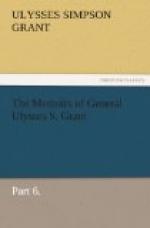This modifies very materially what I have said, and what has been said by others, of the conduct of General Lew. Wallace at the battle of Shiloh. It shows that he naturally, with no more experience than he had at the time in the profession of arms, would take the particular road that he did start upon in the absence of orders to move by a different road.
The mistake he made, and which probably caused his apparent dilatoriness, was that of advancing some distance after he found that the firing, which would be at first directly to his front and then off to the left, had fallen back until it had got very much in rear of the position of his advance. This falling back had taken place before I sent General Wallace orders to move up to Pittsburg landing and, naturally, my order was to follow the road nearest the river. But my order was verbal, and to a staff officer who was to deliver it to General Wallace, so that I am not competent to say just what order the General actually received.
General Wallace’s division was stationed, the First brigade at Crump’s landing, the Second out two miles, and the Third two and a half miles out. Hearing the sounds of battle General Wallace early ordered his First and Third brigades to concentrate on the Second. If the position of our front had not changed, the road which Wallace took would have been somewhat shorter to our right than the River road.
U. S. Grant.
Mount MACGREGOR, new York, June 21, 1885.
(8) NOTE: In an article on the battle of Shiloh which I wrote for the Century Magazine, I stated that General A. McD. McCook, who commanded a division of Buell’s army, expressed some unwillingness to pursue the enemy on Monday, April 7th, because of the condition of his troops. General Badeau, in his history, also makes the same statement, on my authority. Out of justice to General McCook and his command, I must say that they left a point twenty-two miles east of Savannah on the morning of the 6th. From the heavy rains of a few days previous and the passage of trains and artillery, the roads were necessarily deep in mud, which made marching slow. The division had not only marched through this mud the day before, but it had been in the rain all night without rest. It was engaged in the battle of the second day and did as good service as its position allowed. In fact an opportunity occurred for it to perform a conspicuous act of gallantry which elicited the highest commendation from division commanders in the Army of the Tennessee. General Sherman both in his memoirs and report makes mention of this fact. General McCook himself belongs to a family which furnished many volunteers to the army. I refer to these circumstances with minuteness because I did General McCook injustice in my article in the Century, though not to the extent one would suppose from the public press. I am not willing to do any one an injustice, and if convinced that I have done one, I am always willing to make the fullest admission.




